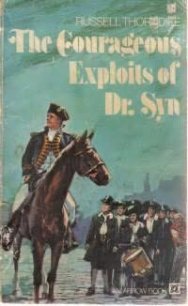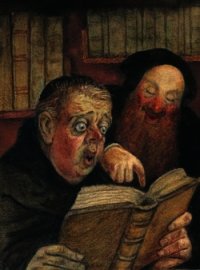Doctor Syn on the High Seas - Thorndike Russell (читать лучшие читаемые книги TXT) 📗
living. Sir Charles had arranged that t his should be as soon as
possible, since the old Vicar was only too anxious to retire to private
life. This kindly old man allowed the young couple free access to their
future home, and Doctor Syn was thus enabled to plan the various
alterations which Imogene suggested for the house. On the assurance from
his uncle, Old Solomon Syn, the Lydd attorney, that there was no great
need to study economy, the young parson spent freely, buying whatever
furniture and house trimmings pleased his bride. These two rooms were
to be thrown into one, to afford the Doctor a more spacious study. This
he allowed on her suggestion, on condition that she allowed the
breakfast-room to be discarded to give more space to her drawing -room.
Each proposal gave birth to a dozen more, until the bewildered old Vicar
mildly remarked that they might as well pull the old house down and
start to build a fresh.
“Oh no!” cried Imogene. “I love these whitewashed walls. They remind
me of the white walls of Spain. And if we built another wing to match
that of the new kitchens, the old Vicarage would be like an ancient gem
in a new setting.” And so another wing was planned.
“But what use we shall we put the extra rooms to, I cannot imagine.”
“I suggest,” said the old man —”and hope so too—that ere long you
may need nurseries.”
“Of course,” replied the delighted Imogene, without the vestige of a
blush. “We must have house room for the children, Christopher.”
Eyeing the back of the house, where the garden ran down in a gentle
slope to meet a broad dyke, Imogene clapped her hands as a new idea was
born.
- 53 -
“Although I must not disturb you when you work in your library, we
would feel nearer to each other if we joined our rooms upon the outside.
We could keep our windows wide open and feel we were in the same room.”
“Whatever do you mean?” laughed the Doctor.
“Outside our bedroom window,” she explained, “we could build a
balcony. Supported by pillars from the garden which we can pave, we
would have a lovely Span ish alcove outside our sitting-rooms. In the
sun, if it ever shines here, we could sit under it, and when Nicholas
comes to visit us he will be able to sing us his lovely Spanish songs.
Oh, Christopher, I shall always sit there if you will have it built.
You will? You must. To please me?”
All this was duly explained to the builder, an old friend of the Syn
family and a Dymchurch man, who could build anything from a boat to a
castle. His name was Wright, and it was he who first opened Doctor’s
Syn’s eyes to something about his wife which he would never have though
possible.
“I should think well, Reverend Sir,” he advised. “these alterations
will cost money which will be wasted should your lady wife decide to
move. She is no lover of our marsh, I can see.”
This attitude had never occurred to Doctor Syn. Loving the Marsh as
he did in all weathers, he imagined that others would feel the same
appreciation for it. This worried him, and whenever he saw a sad look
come into his bride’s face, he wondered whether it was homesickness for
Spain and mother, or dislike of the place that was to be her home.
When she realized that he was disappointed at her lack of enthusiasm
for the Marsh, she pretended a growing liking for it, but as the time
approached for their return to Oxford she could not disguise her joy.
He did not know whether this was occasioned by the thought leaving the
Marsh, or the prospect of returning to White Friars, where they had
taken rooms. When he asked her outright she gave a different reason.
She wanted to be at Oxford to welcome Nicholas on his return from Spain.
“Of course you do,” cried Syn cheerfully. “And so do I. I miss the
jolly rascal more than I can say.”
Chapter 8
The Elopement
Soon after their return to Oxford they received a letter from
Nicholas stating that urgent business had kept him in Spain, and that he
had been obliged to let his ship set sail without him, but hoped to be
aboard her upon the next home voyage. He asked them to send an answer
containing all their news by the hands of his sailing-master, who was
then discharging cargo in London Docks.
You will be glad to know, my dear Imogene, that I escorted your dear
mother safely to her home, where I have seen her constantly. She is
already comp letely recovered from her shock, and is glad to be once more
in the sunniest of countries. I trust, my dear Doctor, you are becoming
proficient in the Spanish tongue. It will amuse you to know that I am
passing everywhere as Spanish born. This I have done with the Senora’s
connivance, because we found the English are unpopular, owing to the
political state of Europe. Will you therefore be so good as to address
whatever letters you may care to send to Senora Nikola Tappittero, which
is the high-sounding name I have adopted? You would be shocked to hear
how venomously I rave against the British people.
- 54 -
It is the only means by which I can get some honest trading. For you,
my dear Imogene, I have purchased a scented lace mantilla, if indeed an
English parson’s wife be allowed to wear such vanity. Also a guitar of
such sweet tone that it took my immediate fancy. The case, too, is very
cunningly inlaid. For the diversion of our dear Doctor, I have run to
earth a fine old edition of comical Don Quixote.
Although no scholar myself, I have yet appreciation for his wit.
Trusting to find you both in Oxford still on my return, I subscribe
myself
Your Spanish friend of the family,
Nikola Tappittero.
A postscript added:
I hope the ho neymoons were happy both in Dymchurch and the Cotswolds.
I have sent my felicitations to our excellent Tony and his bride.
“Oh, Christopher,” cried Imogene, “promise to stay at Oxford till he
comes. Dymchurch seems so far away.”
“Are you anxious for the mantilla and guitar?” he asked, “or is it
Nicholas you want to see?”
“I want to be warmed with the reflection of the Spanish sun,” she
answered.
The mail brought constant news from Dymchurch. Tony and his bride
had returned, were duly thrilled at the rebuilding of the vicarage,
which work was going forward rapidly, since the old Vicar had moved into
his house at Burmarsh, praising especially the Spanish alcove which they
said was something like a cloister. Doctor Syn noticed that Imogene was
more interested in this than in all the other additions put together.
“Tony says that the builder has let in two double seats in the wall
of it,” she said. “He says it will hold us two in one, and than in the
other. But when Nicholas is with us with his guitar, I except he will
sprawl all over one of them, just like a lazy Spaniard. But we shall
see him first in Oxford. Promise me that, my Christopher?”
“That promise you must get from Nicholas,” he answered. “Duty is
duty, and Sir Charles is anxious for me to take mine up as soon as
possible. My Induction papers will be ready in a week or so, and when I
am commanded, I must go. If the house is not quite ready for you, I
could come back here to fetch you when it is. I would rather you came
with me, though, for we could stay at the Cobtrees’, and your wishes for
the house could be the easier carried out.”
“Let us write and tell Nicholas he must come back on the next homing




